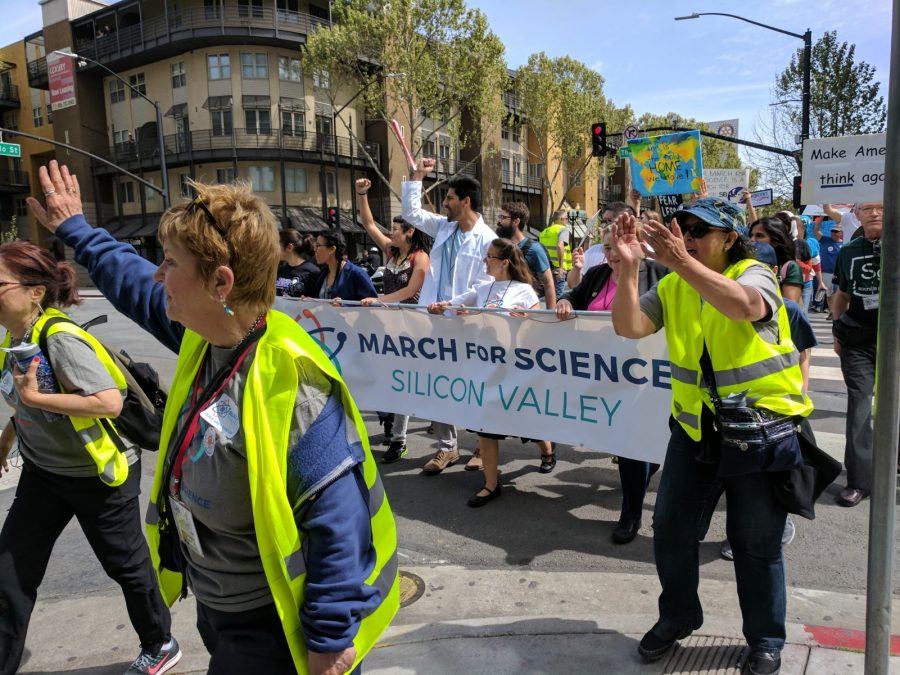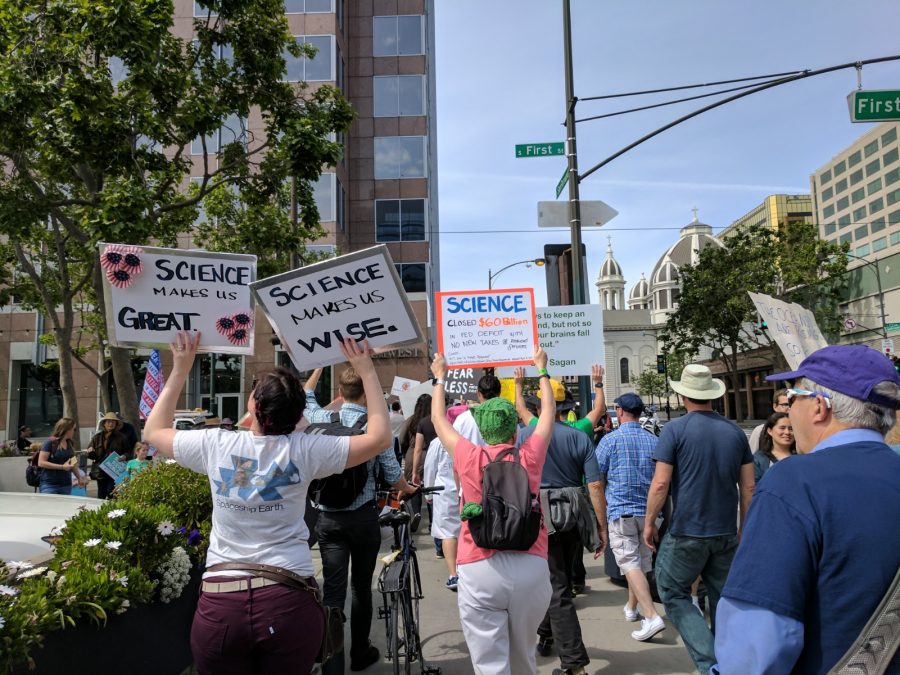Marches for Science held across US and world
Protestors participating in the March for Science in San Jose carry signs and chant slogans. Worldwide, 610 satellite marches were held in addition to the main march in Washington, D.C.
April 22, 2017
Advocates for unfettered science and evidence-based policy took to the streets across the world to participate in the March for Science held today, Earth Day.
The March for Science is a worldwide movement that advocates for evidence-based policies, improved science education, and the free expression of scientific findings.
On the March’s website, it describes itself as a “diverse, nonpartisan group to call for science that upholds the common good and for political leaders and policy makers to enact evidence based policies in the public interest.” And while the march describes itself as nonpartisan, it also states that it is “explicitly a political movement.”
While the originally planned March for Science took place in Washington, D. C., the Washington march inspired the organization of 610 “satellite marches” across the United States and the world. In the Bay Area alone there were five marches, held in Berkeley, San Francisco, Pacifica, Hayward, and San Jose.
In the satellite march in San Jose, styled as “March for Science Silicon Valley” by its organizers, participants marched from San Jose City Hall to the Plaza de Cesar Chavez to rally and listen to speakers. Those who spoke at the event include Nobel laureate and Stanford University professor of chemistry Dr. William E. Moerner; neuroscientist and actress in “Big Bang Theory” Dr. Mayim Bialik; founder of the nonprofit Black Girls Code Kimberly Bryant; and Congresswoman Zoe Lofgren.


















![“[Building nerf blasters] became this outlet of creativity for me that hasn't been matched by anything else. The process [of] making a build complete to your desire is such a painstakingly difficult process, but I've had to learn from [the skills needed from] soldering to proper painting. There's so many different options for everything, if you think about it, it exists. The best part is [that] if it doesn't exist, you can build it yourself," Ishaan Parate said.](https://harkeraquila.com/wp-content/uploads/2022/08/DSC_8149-900x604.jpg)




![“When I came into high school, I was ready to be a follower. But DECA was a game changer for me. It helped me overcome my fear of public speaking, and it's played such a major role in who I've become today. To be able to successfully lead a chapter of 150 students, an officer team and be one of the upperclassmen I once really admired is something I'm [really] proud of,” Anvitha Tummala ('21) said.](https://harkeraquila.com/wp-content/uploads/2021/07/Screen-Shot-2021-07-25-at-9.50.05-AM-900x594.png)







![“I think getting up in the morning and having a sense of purpose [is exciting]. I think without a certain amount of drive, life is kind of obsolete and mundane, and I think having that every single day is what makes each day unique and kind of makes life exciting,” Neymika Jain (12) said.](https://harkeraquila.com/wp-content/uploads/2017/06/Screen-Shot-2017-06-03-at-4.54.16-PM.png)








![“My slogan is ‘slow feet, don’t eat, and I’m hungry.’ You need to run fast to get where you are–you aren't going to get those championships if you aren't fast,” Angel Cervantes (12) said. “I want to do well in school on my tests and in track and win championships for my team. I live by that, [and] I can do that anywhere: in the classroom or on the field.”](https://harkeraquila.com/wp-content/uploads/2018/06/DSC5146-900x601.jpg)
![“[Volleyball has] taught me how to fall correctly, and another thing it taught is that you don’t have to be the best at something to be good at it. If you just hit the ball in a smart way, then it still scores points and you’re good at it. You could be a background player and still make a much bigger impact on the team than you would think,” Anya Gert (’20) said.](https://harkeraquila.com/wp-content/uploads/2020/06/AnnaGert_JinTuan_HoHPhotoEdited-600x900.jpeg)

![“I'm not nearly there yet, but [my confidence has] definitely been getting better since I was pretty shy and timid coming into Harker my freshman year. I know that there's a lot of people that are really confident in what they do, and I really admire them. Everyone's so driven and that has really pushed me to kind of try to find my own place in high school and be more confident,” Alyssa Huang (’20) said.](https://harkeraquila.com/wp-content/uploads/2020/06/AlyssaHuang_EmilyChen_HoHPhoto-900x749.jpeg)











